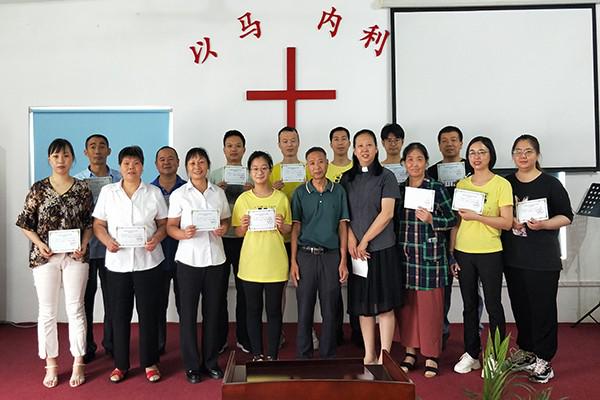Volunteers are an essential ministry group in churches. In certain grassroots churches, volunteers are even entrusted with the responsibility of preaching. The Church in China has long agreed to enhance the quality of volunteers through training. How can we fulfill service demands through volunteer training? The article shares a case study of a volunteer training course that may prove enlightening.
Fifteen years ago, the Christian Council and the Three-Self Patriotic Movement (CC&TSPM) of H City in Guangdong Province initiated a one-month, once-a-year volunteer training program. Subsequently, the church leaders of H City expressed dissatisfaction with the rudimentary nature of the training, and thus expanded the latest training program to twice a year, spanning four semesters, each lasting for one month. The pastor-in-charge of the training course, Pastor C, reported that 14 out of the initial 24 applicants completed the training, far exceeding their original expectations.
One female believer came from a grassroots church situated amidst the nearby mountains of H City, where no full-time pastors were systematically trained in theology. With a smile, she explained that her job refusal was due to the unavailability of leave for such a prolonged period, stating her anticipation over the course's duration. I enquired whether she had decided to work full-time upon completing the training, but to my surprise, she claimed to be undetermined, mentioning that she would search for another job elsewhere.
Pastor C stated that mastering this knowledge is akin to attaining basic theology expertise, as the courses comprised fundamental heavyweights of Christianity such as Synopsis of the Old Testament, Synopsis of the New Testament, and Introduction to the Five Books of Moses. Additionally, theoretical subjects like Systematic Theology, Church Music, and Worship Etiquette were included in the program alongside practical subjects like the Law of Evangelism, Preaching, and Pastoral Epistle Study. This training helped to build a faith structure for volunteers that would secure the church from straying even in the absence of a pastor.
Many churches faced financial constraints in hiring highly qualified teachers. In response, Pastor C mentioned taking the opportunities of exchanges and lectures by pastors in Guangdong by inviting these excellent pastors or lecturers to H City to offer short-term lessons to these volunteers. For instance, they once invited a Canadian professor to train them in hospice care, an example of how they sought to maximize opportunities actively.
In addition to increasing individuals' knowledge reserve, they took students on visits to churches in nearby S cities during the completion period. Pastor C remarked that "expanding one's horizon by gaining knowledge" was the essence of the volunteer training.
One female believer who left her job to attend the training commented, saying that the training not only taught her how to study the Bible but also how to lead a fellowship in the future. She learned that worship could include specific processes and content, thus helping her to avoid misunderstandings with churches of different practices. Consequently, she developed the confidence to mediate when people criticized others based on their worship traditions. Her courage grew, and she could now pray, lead worship sessions, and praise or share in public without fear.
Another female volunteer, G, who works as a doctor, often confronted situations related to abortions, gays, AIDS, syphilis, and other illnesses. She was initially unsure of how to handle these cases, but these classes gave her valuable insight and ideas.
- Translated by Nicolas Cao












